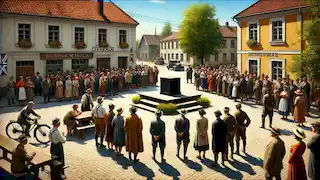In the heart of the small town of Millville, the arrival of summer brought not just warmth and blooming flowers, but also a sense of unease that rippled through the community. This unease centered around a tradition so old and ingrained that few questioned its purpose or origin. The event, simply known as "The Lottery," was held every year on June 27th, an occasion that was both celebrated and feared by the townsfolk.
Millville was a small, close-knit community where everyone knew everyone else's business. The town’s population had remained steady for generations, with families that had lived there since its founding. The streets were lined with quaint houses, each with a perfectly manicured lawn, and the town square was the gathering place for all important events. The Lottery, however, was the most significant event of all, an event that brought the entire town together in a way that nothing else could.
The tradition of The Lottery had been passed down through the generations, and while some of the details had changed over time, the core of the ritual remained the same. No one could remember exactly when The Lottery had started or why, but it was generally accepted that it had something to do with ensuring a good harvest. There were vague references to ancient practices, to sacrifices made to appease the gods, but these were dismissed as old wives' tales. What was certain was that The Lottery had become a ritual of such importance that to question it was to question the very foundation of Millville society.
As the morning of June 27th dawned, the townspeople began to gather in the square, their moods somber despite the bright, sunny day. Children, released early from school for the occasion, ran about in the square, their laughter and shouts a stark contrast to the tension that hung in the air. They were too young to fully understand the significance of The Lottery, though they sensed its importance from the hushed conversations of their parents and the nervous glances exchanged among the adults.
The men of the town stood in small groups, discussing the latest news—crops, weather, and other mundane topics—while casting occasional glances toward the center of the square, where the black wooden box had been placed on a sturdy table. The women, on the other hand, gathered in quieter groups, their voices low and their expressions serious. They spoke of the lottery in careful tones, their words guarded and their eyes occasionally drifting to their children, who were blissfully unaware of the weight of the day.
The black box, the central symbol of The Lottery, was a simple, unadorned object, but it carried with it an air of menace. It was old, the wood worn smooth by years of handling, and it had a faded quality, as though it had absorbed the fear and tension of countless lotteries before. The box was stored throughout the year in a secure place—some said it was kept in the town hall, others believed it was hidden in the coal company office—but wherever it was, its reappearance each June sent a shiver down the spine of every adult in Millville.
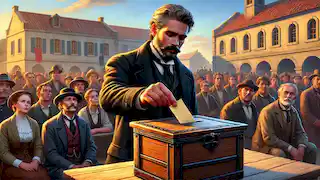
The preparations for The Lottery were overseen by Mr. Summers, the jovial and efficient owner of the local coal business. Mr. Summers was a man of middle age, with a round, good-natured face and a voice that carried authority without needing to be loud. Despite his friendly demeanor, there was a solemnity about him on this day, a seriousness that belied the usual twinkle in his eye. It was his responsibility to ensure that the lottery was conducted fairly and without incident, and he took this duty very seriously.
Mr. Summers arrived early in the square, accompanied by Mr. Graves, the town’s postmaster. The two men worked in tandem, setting up the table and placing the black box at its center. Mr. Graves was a tall, thin man with a stern expression, a man of few words who approached his duties with the same meticulous care as Mr. Summers. Together, they represented the authority of the town, the upholders of its most sacred tradition.
"Morning, Mr. Summers," Mr. Graves said as they positioned the box on the table.
"Morning, Mr. Graves," Mr. Summers replied. "Looks like we’ve got a good turnout this year."
Mr. Graves nodded, glancing at the crowd that was beginning to gather around them. "As always."
Mr. Summers opened the box, revealing the slips of paper inside. There was one slip for each family in the town, carefully folded and placed in the box by Mr. Summers and Mr. Graves the night before. On all but one of the slips, the paper was blank. But on one slip, there was a single, ominous black dot. That slip, the marked one, was the key to the lottery's grim conclusion.
As the townspeople continued to gather, Mr. Summers and Mr. Graves began the process of mixing the slips of paper, ensuring that they were thoroughly shuffled before the drawing began. The crowd watched in silence, their faces a mixture of anticipation and dread. This was the moment that set the tone for the rest of the day, the moment when the lottery truly began.
"All right, folks," Mr. Summers called out, raising his voice to address the crowd. "Let’s get this started. We all know the rules, so let's make it quick and easy."
There was a murmur of agreement from the crowd, but it was clear that no one was eager to begin. The air was thick with tension, and the usual chatter that accompanied gatherings in the town square was absent. The lottery was not a time for idle conversation; it was a time for solemnity, for duty, for the adherence to a tradition that none dared question.
Mr. Summers nodded to Mr. Graves, who stepped forward and began calling out the names of the families, one by one. As each name was called, the head of the family—usually the father or the eldest son—would step forward to draw a slip of paper from the box. The process was quick, almost mechanical, but it was fraught with a silent intensity that made the air feel heavy.
"Adams," Mr. Graves called out, and a tall man with graying hair stepped forward. Mr. Adams drew his slip and returned to his family, his face impassive, his hands steady.
"Clark," came the next name, followed by "Delacroix," "Henderson," "Martin," and so on. Each man approached the box with a mixture of resignation and determination, each one aware of the possibility that this year, it might be his family that was chosen.
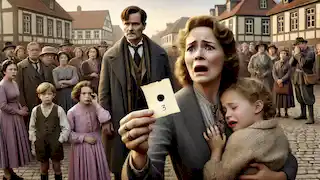
The town waited in silence as the slips were drawn, each family holding their breath as they clutched their small piece of paper. The tension in the square grew with each passing moment, until finally, all the slips had been drawn. Mr. Summers looked out over the crowd, his expression unreadable.
"All right," he said, his voice breaking the silence. "Let's open them up."
There was a collective intake of breath as the townspeople unfolded their slips, each person’s eyes scanning for the dreaded black dot. For most, there was a sigh of relief as they saw only the blank white paper. But one family remained frozen, their slip still unopened.
The Hutchinsons.
Bill Hutchinson, a tall man with a strong build, stood with his wife Tessie and their three children. The family had moved to Millville several years ago, and while they were relatively new compared to some of the other families, they had quickly become a part of the community. Bill was well-liked, a hard worker, and a devoted husband and father. Tessie was known for her sharp wit and lively personality, often seen chatting animatedly with the other women in town.
But now, as the crowd's eyes turned toward them, the Hutchinsons stood in stunned silence. Tessie held the slip of paper tightly in her hand, her knuckles white as she stared at it, unwilling to open it.
"Go on, Tessie," someone from the crowd urged, their voice tinged with impatience. "Let’s see what you’ve got."
Tessie’s hands trembled as she slowly unfolded the paper. When she saw the black dot in the center, her breath caught in her throat. For a moment, she was too shocked to speak, too stunned to react.
Then, the reality of what the black dot meant hit her like a ton of bricks. Her eyes widened in horror, and she looked around at the faces of the townspeople, searching for some sign of mercy, some indication that this was all a terrible mistake.
"It’s not fair!" Tessie cried out, her voice trembling with shock and fear. "It’s not fair! It wasn’t supposed to be us!"
But the rules of The Lottery were unyielding, and there was no room for debate. The crowd began to murmur, a wave of discomfort rippling through the square as Tessie’s pleas filled the air. The lottery had its rules, and those rules had to be followed, no matter how cruel they might seem.
Mr. Summers and Mr. Graves exchanged a glance, their faces grim. They had seen this reaction before, many times, and they knew what had to be done.
"We’ll need to do this quickly," Mr. Summers said, his voice devoid of emotion. He turned to the crowd, his expression firm. "Everyone knows what to do. Let’s get it over with."
The townsfolk knew what was expected of them. Each person stepped forward, taking a stone from the pile that had been prepared earlier in the day. The stones varied in size, some small enough to fit in the palm of a hand, others larger and more unwieldy. But all served the same purpose.
The Hutchinsons were led to the
center of the square, Tessie now pleading for mercy, her earlier defiance crumbling into desperation. But the town had turned to stone, their faces set with a determination that belied the horror of what they were about to do.
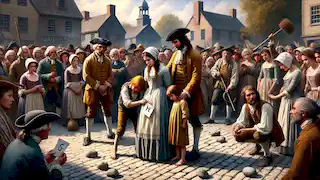
"It wasn’t supposed to be like this," Tessie sobbed, clutching at her husband’s arm. "Bill, do something!"
Bill Hutchinson, his face ashen, looked at his wife with a helplessness that tore at his heart. He had always been a man of action, someone who could solve any problem, but now he was powerless. The lottery had chosen them, and there was nothing he could do to stop it.
"I’m sorry, Tessie," he whispered, his voice choked with emotion. "I’m so sorry."
But there was no time for apologies, no time for goodbyes. The townspeople were ready, their stones in hand, their eyes cold and unfeeling. This was the way things had always been done, the way they would continue to be done. The lottery had its rules, and those rules had to be followed.
As the first stone was thrown, striking Tessie on the shoulder, she cried out, but there was no stopping what had begun. The townspeople moved as one, their hands moving in unison as they hurled their stones at Tessie. Her screams echoed through the square, mingling with the thuds of the stones as they struck her body.
The lottery had chosen, and the town had complied.
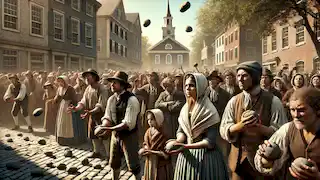
When it was over, there was a silence in the square, a heavy, oppressive silence that seemed to hang in the air like a shroud. The townspeople stood, their faces blank, their hands still holding the stones that had done the terrible deed. For a moment, no one moved, as if the gravity of what had happened had not yet sunk in.
Then, slowly, the crowd began to disperse. The townspeople dropped their stones, their movements mechanical, as they drifted away from the square, back to their homes and their lives. The lottery was over for another year, and life in Millville would return to normal, until the next time the black box was brought out, and the slips of paper were prepared once more.
But for now, the square was empty, save for the black wooden box, still sitting on the table, and the stones scattered across the ground. The lottery had claimed its victim, as it had always done, as it always would.
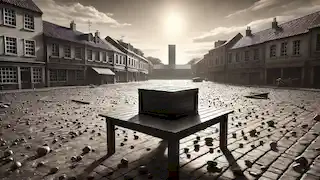
And the town of Millville, its dark secret hidden behind a facade of normalcy, would continue on, unchanged, unchallenged, its traditions upheld by the weight of the years and the power of fear. The townsfolk would go back to their daily routines, the events of the day pushed to the back of their minds, suppressed by a collective silence that ensured the lottery would remain unspoken until the following year.
Children would grow up with the knowledge that someday, they too would stand in the square, their fates tied to the contents of the black box. They would learn not to question, not to resist, but to accept the lottery as an inevitable part of life in Millville. And so, the cycle would continue, each year adding another layer of dread to the tradition that bound them all.
For in Millville, the past was not just history—it was the present, a living, breathing force that shaped their lives and dictated their actions. The lottery was more than just a ritual; it was a reminder of the power of tradition, the danger of blind obedience, and the darkness that could lurk beneath the surface of even the most ordinary of towns.
And as the sun set on Millville that day, casting long shadows across the empty square, the town itself seemed to sigh, a collective breath released after the tension of the day. The lottery was over, and for another year, the town would be at peace. But the memory of the stones, the screams, and the black dot would linger, a ghost that haunted the edges of their consciousness, never fully fading away.
